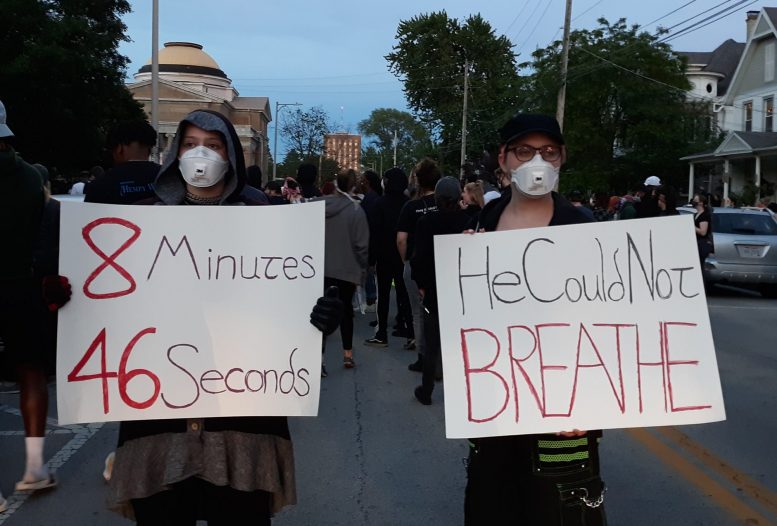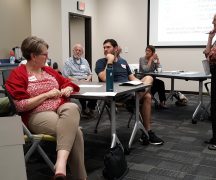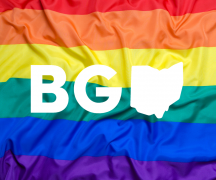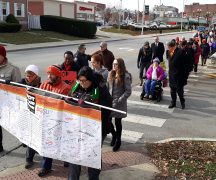By JAN LARSON McLAUGHLIN
BG Independent News
The power of the peaceful protest on Bowling Green streets Sunday was harnessed to create a community conversation Thursday about racial injustice here.
More than 170 people listened in on the WebEx Community Conversation on Race and Equity organized by Not In Our Town Bowling Green.
Moving ahead on the path started by Sunday’s protest will mean more patience from black people, and more discomfort for white people.
Part of the problem, panelists said, is that many white people – here in Bowling Green and elsewhere – don’t believe racial injustice is real. White people aren’t likely to work on a solution to a problem that they feel doesn’t exist, said Mojabeng Kamala.
Many whites see no reason for black people to fear the police. They don’t believe that black people are treated any differently when they enter stores. They can’t believe that black children are called the “N-word” by their white classmates.
“Believe people of color when they say something is happening,” said Ana Brown, who moderated the two-hour community conversation.
White people need to work on their listening skills, said Atonn Smeltzer.
“We got lazy during the Obama administration,” Smeltzer said. “We all need to be ready to get uncomfortable” and listen to the experiences of local people of color.
Local allies are standing by – but they are unsure of how to help.
On Thursday, help was offered from the Hispanic community.
“I’m here to listen and stand in solidarity with the black community,” said Beatriz Maya, who heads the LaConexion organization. “I’m here, ready to form a platform for equity and justice.”
Help was offered from white community members.
“I’m a white ally, and I want to be a co-conspirator,” said Dr. Jolie Sheffer.
Help was offered from local law enforcement and city officials.
“It’s important for those seeking change to know that community leaders are listening,” said Municipal Administrator Lori Tretter.
“We are beginning to understand the things that we don’t know,” Mayor Mike Aspacher said.
But the path to change is unclear, and centuries of injustice won’t be easily erased. It became clear that allies in the fight can find themselves at odds over the right course of action.
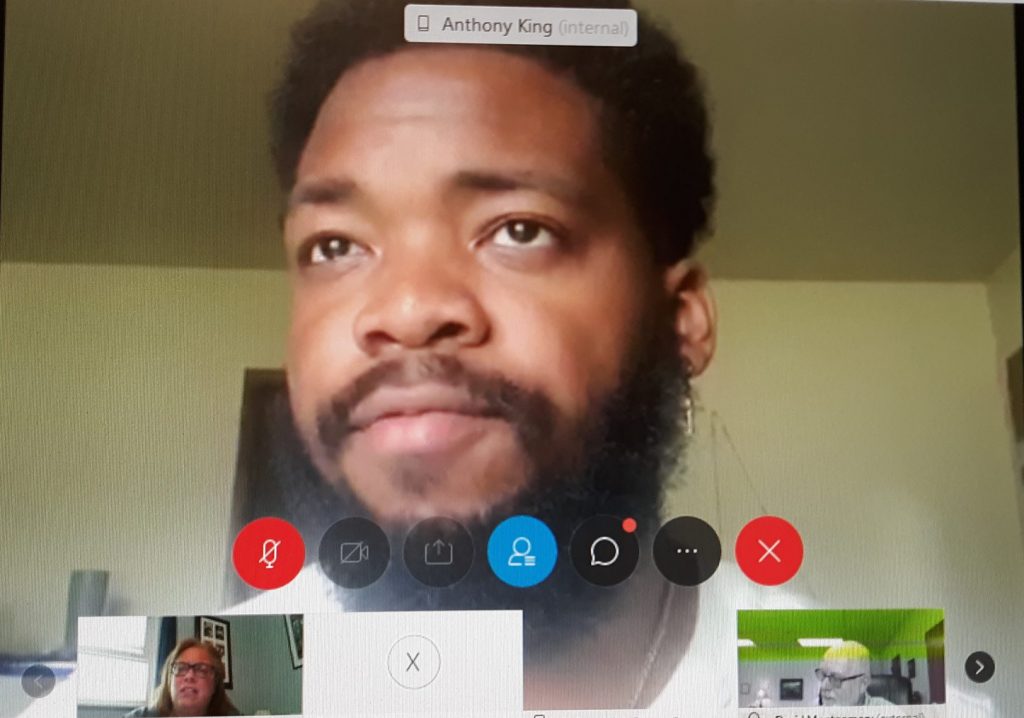
Anthony King, one of the primary organizers of Sunday’s protest that led more than 500 people to push for racial justice in the wake of George Floyd’s death, said he wanted to speak on behalf of those unable to do so.
But he faced criticism on Thursday from a fellow protester, who said King should not have coordinated the march with Bowling Green police and city officials.
“Many felt the protest was a disgrace,” said the unnamed protester.
Involving the police with the plans was a betrayal to black protesters who have no trust in law enforcement.
“Protests with permission are parades,” she said. “When the police are present, black people do not feel safe.”
But King said he felt it would be best to prevent possible pitfalls, so the message of the protest would be heard.
“The police were going to be there anyway,” he said. “We were heard – and it was effective.”
The involvement of white people in the protest was also questioned.
“It felt like the protest was more of an opportunity for white people” to pat themselves on the back, she said. “It felt like it was not for black people, but for white people to assuage their guilt.”
Members of the panel shared some of their experiences with racial injustice.
Dr. Joe Whitehead grew up in southern Mississippi, and attended a segregated school in the 1960s. As times changed, the overt racism he faced in the south shifted to covert racism in the north.
Even now as BGSU’s provost, Whitehead still feels the sting.
He told of returning to Bowling Green from the airport, around midnight, and being pulled over for speeding. He did not question the officer.
“I knew where I was, at midnight,” so he said nothing.
Jennifer McCary told of frequently being pulled over by police years ago as a student at BGSU. Later, when she considered accepting her position as chief diversity and belonging officer at BGSU, she thought back to her earlier experiences in Bowling Green.
“Those interactions made me apprehensive” about returning, McCary said.
And it’s a bigger issue than law enforcement, she said. It’s the glares black people get, it’s the following in stores, and the avoidance on streets. It’s her neighbors who won’t speak to her.
“Those are the things that make you fearful for your family,” McCary said.
“Racism is a pandemic we have lived with forever,” she said.
King told of black people being pulled over for going one or two miles over the speed limit, with the expectation that the driver may have a warrant for arrest. He told of his own experience at Taco Bell, when police stopped him when he didn’t turn on his headlights prior to shifting into gear.
“It’s hard to focus on your school. It’s hard to focus on your responsibilities when you don’t feel safe,” King said.
“It’s like they are waiting for you to mess up,” King said.
Mike Campbell, BGSU public safety director, said the effects of policing go beyond the statistics.
“One of the big challenges is feeling safe,” he said. “It’s hard to function and be part of the community” for someone who feels unsafe.
Bowling Green is still tainted by its history of once being home to a large KKK following, and being considered a “sundown town,” where blacks are not safe after dark.
Sunday’s march was an important move in the right direction, McCary said.
“This protest was one step. A huge step for the people of Bowling Green,” she said.
But where does Bowling Green go from here?
“This is one moment. Things are not going to be solved by one march,” Sheffer said.
Residents must find ways to follow up with long-term, consistent actions, she said. “We all need to be doing what we can in the rooms that we’re in.”
Brown recommended that people get involved with Not In Our Town BG. King asked that people support local black-owned businesses. Aspacher said he would support community book discussions.
More community conversations were urged, with the next one possibly featuring a panel from law enforcement. Future topics could cover community accountability and schools.
McCary suggested police training on implicit bias and targeting.
Others suggested putting the onus where it belongs. Brown told of a recent incident where a white woman called police to report a black woman sitting on a park bench.
Sheffer said nuisance laws are needed to prevent those unwarranted calls to police about black people not “behaving properly.”
King suggested racial sensitivity classes, and Smeltzer said white people should be made aware of the government’s actions to keep down black people.
“So many white people aren’t educated about history,” he said.
Somehow white people need to be convinced that advancement of black people does not mean regression for white people, Whitehead and McCary stressed.
“There is no threat to white people” of black people being successful, McCary said. “There is space for all of us, if we would just create it.”

